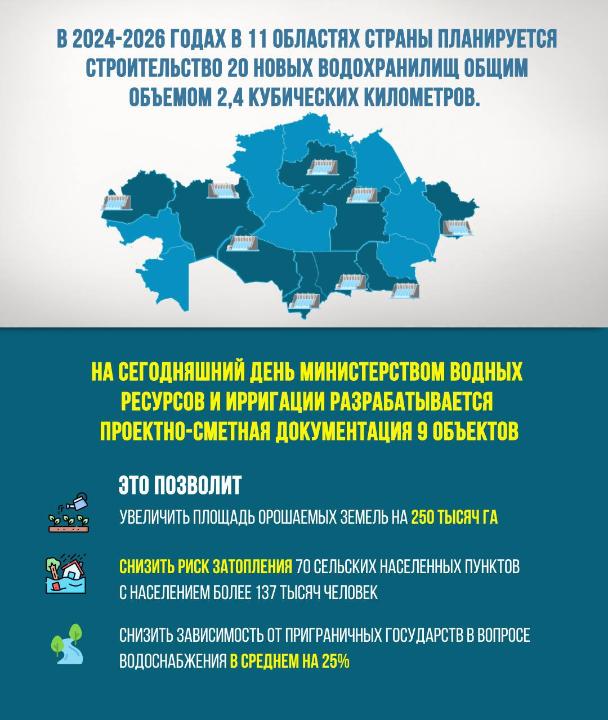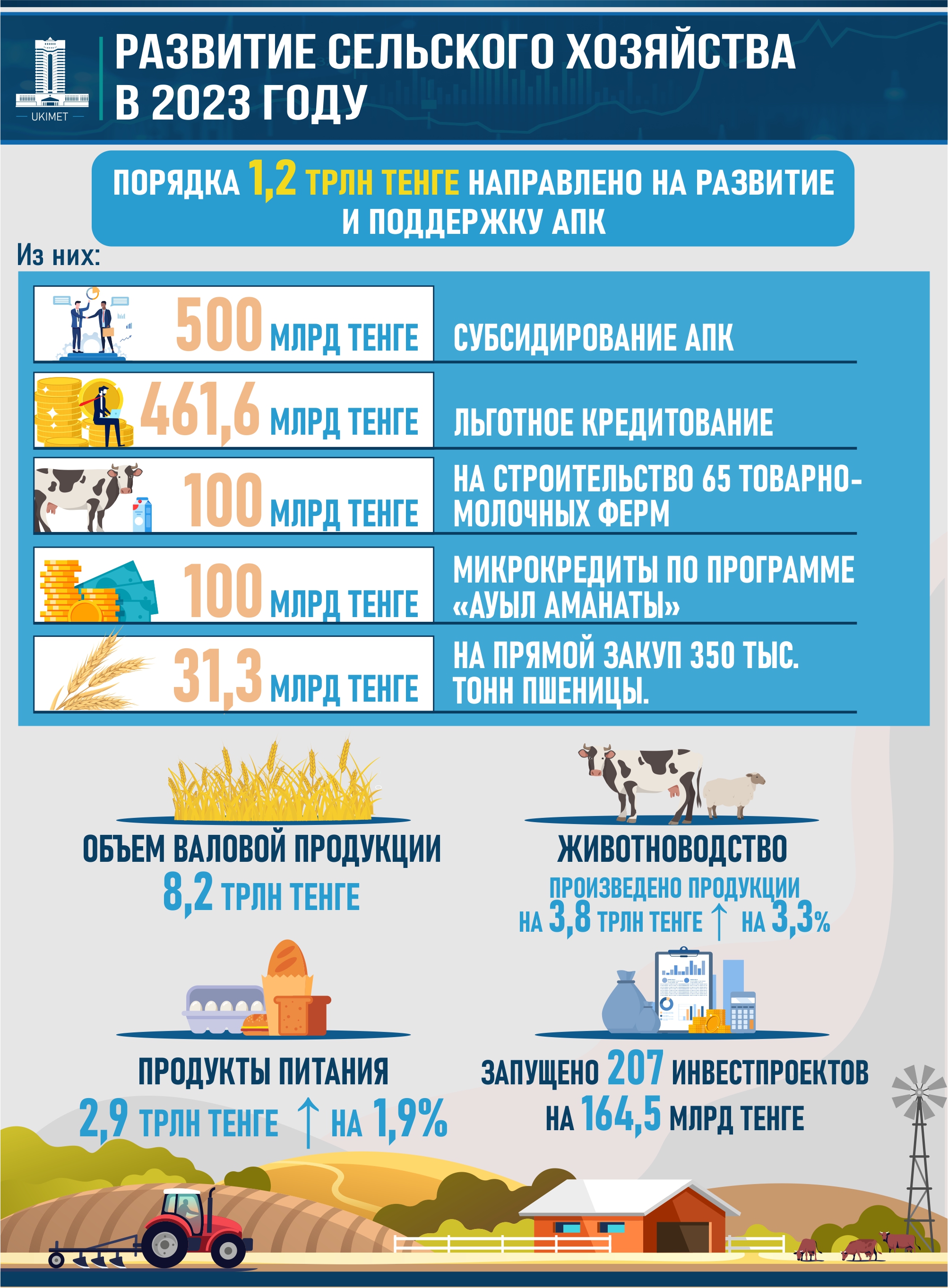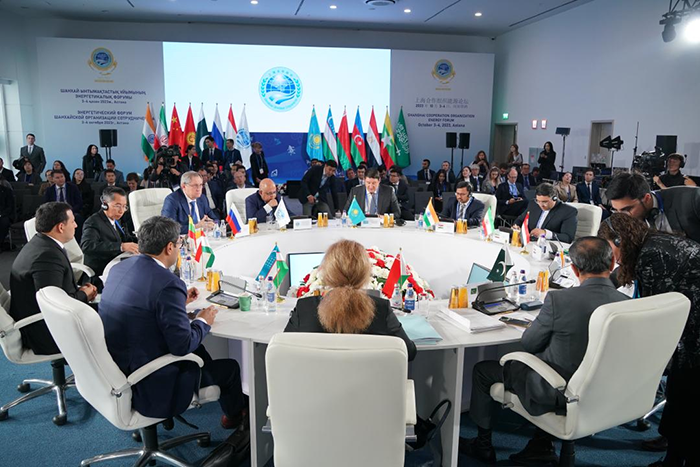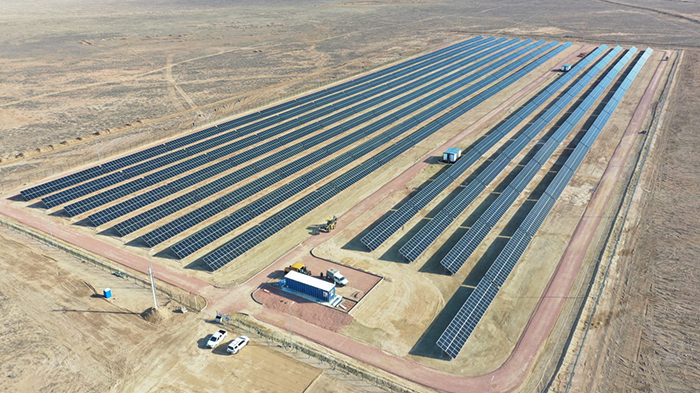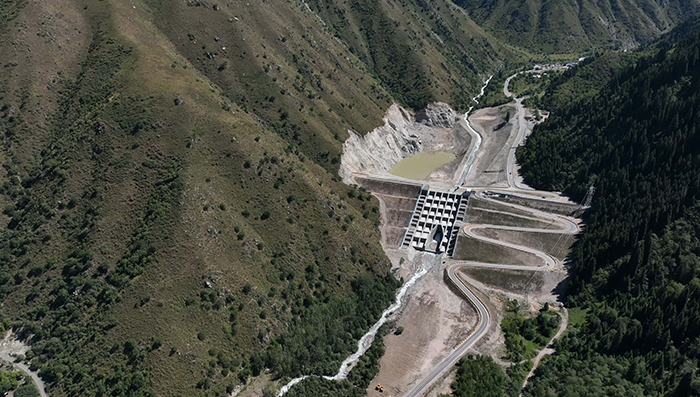
Section 5. Key water developments in the countries of Central Asia
5.1. Republic of Kazakhstan

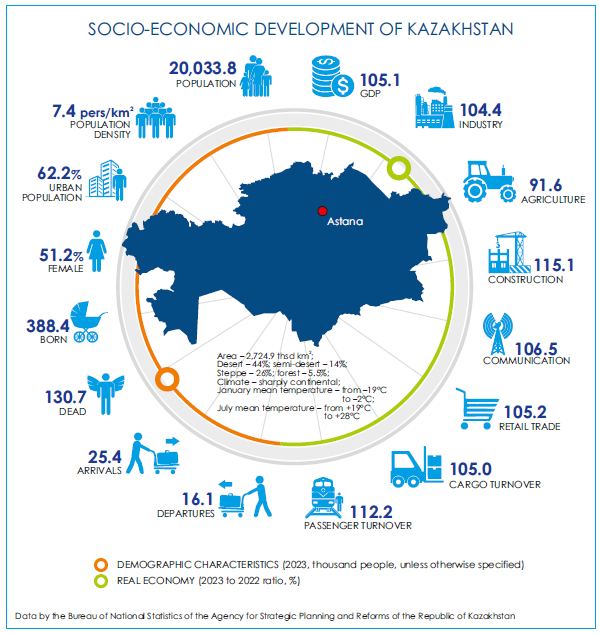
Water Sector
Water resources. In terms of hydrography, the territory of Kazakhstan is divided into eight water basins: Aral-Syrdarya, Balkhash-Alakol, Ertis, Yesil, Zhaiyk-Caspian, Nura-Sarysu, Tobyl-Torgai, and Chu-Talas. Surface waters form the main water resources, with an average annual volume of 102.3 cubic kilometers. Of this total, 50.74 cubic kilometers (49.6%) is local runoff, while 51.56 cubic kilometers (50.4%) flows from transboundary rivers in China, Uzbekistan, Russia, and Kyrgyzstan.
As of March 1, 2023, the average annual runoff in Kazakhstan has decreased by 12.5 cubic kilometers compared to 1960. Of this decrease, 9.0 cubic kilometers (72%) is attributed to local rivers, while 3.5 cubic kilometers (28%) is attributed to transboundary rivers.
There are 4,416 deposits (5,384 sites) with approved exploitable groundwater reserves of 43,120.56 thousand cubic meters per day in the country.
Water infrastructure. Total number of water management facilities is more than 13,000, including: 352 reservoirs, 117 hydroschemes, 472 dams, 8,278 irrigation canals, 246 dikes, 300 ponds, 3,408 pumping stations, wells, collecting drains, and others. In terms of ownership, 6,629 are state-owned, 6,007 – in public utilities, 528 – in private ownership, and 9 facilities have been abandoned.
The total length of irrigation systems is more than 35,000 km, of which 20,600 km are state-owned, 14,700 km – in public utilities and 500 km – in private ownership. Over 14,000 km of irrigation systems are in emergency state, leading to over 40% water loss in transportation.
Public administration reforms. In September 2023, the Ministry of Ecology and Natural Resources was reorganized by separating water management functions and establishment of the Ministry of Water Resources and Irrigation (MWRI RK). The latter is responsible for water resource use and protection, as well as water supply and disposal (Decree No. 318 of 01.09.2023). The Ministry includes the Committee for Water Management (CWM), which oversees strategic planning, regulations, implementation, and control of water use and protection. The CWM manages eight regional basin inspections responsible for regulating water use and protection within their respective areas.
Latest developments in legislation. Several Presidential Resolutions were approved: (1) Resolution No. 100 dated February 9, 2023, "On Amendments to Presidential Decree No. 933 dated December 29, 2017, 'On the List of Water Management Facilities of Special Strategic Importance, Including Those That Can Be Leased or Transferred to Trust Management'; (2) Resolution No. 1245 dated December 29, 2023, "On the Annulment of the Government Resolution of the Republic of Kazakhstan No. 21 dated January 9, 2004, 'On the Approval of the Rules for Water Regulation Between Provinces in the Republic of Kazakhstan.'
New appointments. Nurzhan Moldiyarovich Nurzhigitov was appointed as the Minister of Water Resources and Irrigation (UPRK No. 337 of 04.09.2023), and Arsen Armanovich Zhakanbaev was appointed as the Chairman of the Committee for Water Management.
Meetings of the Water Council of Kazakhstan. Recent meetings of the Water Council have focused on: (1) enhancing the effectiveness of the authorized body for water resource use and protection, strengthening basin inspections and training water specialists, fortifying water diplomacy efforts, establishing a Consortium of leading water research and educational institutions, accelerating the adoption of digital technologies and automated risk management systems in the water sector (June 29); (2) MWRI's initiatives, including on establishment of the (а) National hydrogeological service to monitor and assess groundwater, control the state of irrigated lands, maintain a groundwater cadastre, carry out prospecting and exploration operations, and deal with decommissioning and conservation of hydrogeological wells and (b) Caspian Sea Research Institute, which will conduct comprehensive research on the Caspian Sea and its coastal zones (December 11).
Results of the MWRI RK in 2023. The Ministry has developed several key documents: (1) Draft of the new Water Code, which aims to preserve water and resource potential of Kazakhstan, increase the role of society in water resource management, digitalize and ensure safety of hydraulic facilities, manage irrigation and drainage, water supply and discharge; (2) Concept of Water Management System Development for 2024-2030 (PPRK No. 66 of 05.02.2024), which aims to increase the area of irrigated lands up to 2.2 million ha, bring the share of water-saving technologies to 40%, reduce irrigation water losses in transportation up to 15%, etc.; (3) Comprehensive Water Sector Development Plan for 2024-2030.

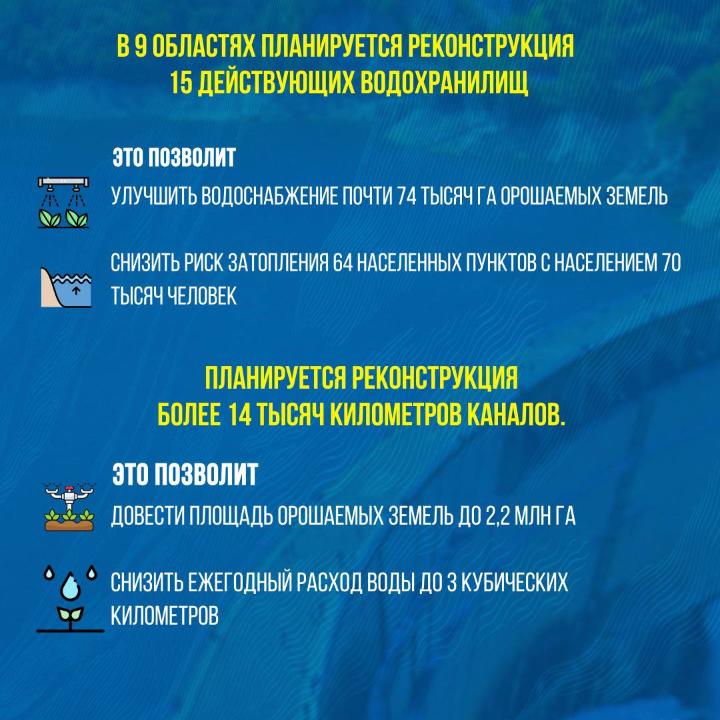
To enhance water resource management efficiency and create a unified information system, the MWRI RK is collaborating with the national company "Kazakhstan Space Technologies" to develop an interactive geoinformation platform (https://hydro.gov.kz). The platform will establish a central depository for water-related data, including water bodies, hydraulic facilities, water basins, gauging stations, etc.
Projects. Ongoing projects: (1) Second Irrigation and Drainage Improvement (WB, 2013-2025). Construction progress varies by province, with the national average reaching 70% completion, and some areas approaching 90%; (2) "Governance of Groundwater Resources in Transboundary Aquifers" (GGRETA) , which aims to strengthen joint management of the Tashkent area Transboundary Aquifer (TBA) ; (3) USAID Regional Water and Vulnerable Environment Activity ($21.5 million, October 2020 - September 2025), which aims to strengthen regional capacity to manage shared water resources and mitigate environmental risks in the Syr Darya and Amu Darya River basins.
The MWRI RK and GIZ have signed an agreement on implementation of the regional program "Water Resource Management in Central Asia in the context of Climate Change" (October 18, Astana).
Capacity building. In 2023, the staff of basin inspections under the Ministry of Water Resources and Irrigation of the Republic of Kazakhstan (MWRI RK) was increased from 98 to 242 personnel. The Ministry has also undertaken several key initiatives: proposed the inclusion of new programs in the current classifier of higher and postgraduate education disciplines; advocated for the allocation of grants to support Kazakh students pursuing water-related disciplines at universities abroad; launched joint training programs in collaboration with the Tashkent Institute of Irrigation and Agricultural Mechanization Engineers (TIIAME); announced plans to introduce professional development programs tailored to the water sector.
Events. A regional workshop was held on monitoring, assessment and information sharing in transboundary basins of Central Asia (February 1-2, Astana).
The delegation of Kazakhstan participated in the: (1) UN Water Conference 2023 (New York, USA, March 22-24,); (2) International Conference "Central Asia: Towards a Sustainable Future through a Strong Regional Institution" on the occasion of the 30th Anniversary of IFAS (Dushanbe, Tajikistan, June 5-7,); (3) 2nd Flash Flood Guidance System Global Workshop (Skopje, Republic of North Macedonia, June 19-23); (4) extraordinary session of the Intergovernmental Council of Hydrological Program (Paris, France, November); (5) meeting of experts of the CA states on water resource management in view of climate change (December 7, online).
Regional and international cooperation. Kazakhstan hosted and participated in meetings of bilateral and trilateral joint working groups and commissions on water with Central Asian countries. See Cooperation between the Countries of Central Asia on Water and Other Matters.
The President of Kazakhstan participated in the meeting of the Council of Heads of State-Founders of IFAS (Dushanbe, Tajikistan, September 15,). Delegation of Kazakhstan took part in the: (1) 84th (Dushanbe, Tajikistan, May 10,) and 85th (Tashkent, Uzbekistan, November 1-2,) meetings of the ICWC; (2) IFAS Board meeting (Dushanbe, Tajikistan, June 5). Authorized representatives of Kazakhstan participated in the Working Group on Institutional and Legal Improvement of IFAS. The Republic of Kazakhstan assumed the chairmanship of the International Fund for Saving the Aral Sea (IFAS) for the 2024–2026 term. President Kassym-Jomart Tokayev of Kazakhstan was elected as the Chairman of IFAS. See IFAS and Other Regional Organizations in Central Asia.
Kazakhstan held and participated in the meetings of the Working Groups of the Joint Kazakhstan-Russia Commission on the Use and Protection of Transboundary Water Bodies focused on various river basins, including Ertis/Irtysh (March 15, online; September 5, Omsk, Russian Federation), Yesil/Ishim (July 12, Petropavlovsk), Tobol (March 16, online; August 17, Kurgan, Russian Federation), Zhaiyk/Ural (August 24, online), Kigach, Karaozen. Additionally, the XIII Meeting of the Commission took place on December 6–7 in Almaty. Implementation of a Unified Roadmap aimed at enhancing cooperation on research within the basins of major rivers, such as the Ural, Irtysh, and other transboundary water bodies was discussed at the bilateral working meeting of experts from Kazakhstan and the Russian Federation (October 20, Yekaterinburg, Russian Federation).
In addition, within the framework of the Joint Kazakhstan-China Commission on the Use and Protection of Transboundary Rivers, five events were organized in cooperation with the People's Republic of China.
Drinking Water Supply
2023 Results and Plans. The Kazakh Ministry of Industry and Construction has reported significant progress in access to water supply services: urban areas: 98.9% access, with 100% coverage in 9 provinces; rural areas: 96.6% access, with 100% coverage in Mangistau, Atyrau, and Almaty provinces; however, there are areas with lower coverage, such as Pavlodar and Abay provinces. To further improve access and infrastructure, the government has allocated 218 billion KZT for the construction and reconstruction of water supply and wastewater disposal systems in both urban and rural areas.
The Concept for Housing and Communal Infrastructure Development for 2023-2029 outlines goals to improve Kazakhstan's water infrastructure: by 2030, the depreciation of water supply and wastewater disposal networks will be reduced from 51% to 40%; the population's access to water supply services will be increased by 2.1 million people; in cities of national and provincial importance, wastewater treatment will be increased from 77.7% to 98.1%.
The MWRI RK continued implementing: (1) 33 projects to improve water supply and modernize water supply systems in 375 settlements with a total population of 868,000 people; (2) 35 investment projects to reconstruct and modernize hydraulic facilities; (3) a project to improve irrigation and drainage systems on the area of 105,100 ha in Almaty, Zhambyl, Kyzylorda and Turkistan provinces. To ensure a stable water supply for Astana, 93 million cubic meters of water were transferred from the K. Satpayev Canal to the Esil and Nura rivers.
Agriculture
2023 results According to the Ministry of Agriculture of the Republic of Kazakhstan (MA RK), the total area under crops reached 23.4 million hectares, marking an increase of 68.6 thousand hectares compared to the previous year. Farmers harvested 17 million tons of grain crops. The harvest of oilseeds amounted to 2.2 million tons and production of fodder crops reached 5 million tons.
Kazakhstan boasts over 2.3 million hectares of irrigated land, yet traditional methods still dominate its irrigation practices. In 2023, out of the 1.5 million hectares under actual irrigation 75% relies on furrow irrigation, 6% is under flood irrigation (primarily for rice), and 21% is covered by modern irrigation (drip or sprinkler). To encourage a shift towards water-saving methods, the Kazakh government has taken steps. The Order of the Kazakh Minister of Agriculture No. 409 of 20.11.2023 amended the subsidy rules to increase subsidies for purchasing and installing water-saving technologies from 50% to 80% and local budgets will contribute 30% subsidy.
The interactive map Jerkarta.gharysh.kz was updated to reflect locations and areas of all reclaimed agricultural lands and to include data on territories that lack of pasture lands.
New appointments. Aidarbek S. Saparov was appointed as the Minister of Agriculture (UPRK No. 336 of 04.09.2023).
Projects. Ongoing projects: (1) Sustainable Food Systems and Improved Ecosystems Service (UNDP, 2021-2026); (2) Delivering a Climate Change Strategy for Central and West Asia (ADB, $3 million, 2022-2025); (3) Restoration of Sustainable Landscapes in Kazakhstan (WB, $3.8 million, 2021-2025).
The S. Seifullin Kazakh Agrotechnical Research University (KazATU) started implementing the scientific and technical program "Development of new technologies for organic production and agricultural processing" (4 billion KZT), which aims to contribute new technologies for organic production and processing of agricultural products based on the principles of green economy and regional technological parks and engineering centers in agro-industry. The program is to develop an information and analytical database for innovations in the field of organic agriculture, including the digital platform for agricultural entities.
For UNDP projects and FAO efforts on agriculture and food, see the United Nations and its Specialized Agencies.
Events. The following events were organized: (1) dedicated exhibition "Kazakhstan Field Day "Jańa Dala/Green Day 2023" (Akmola province, July 13-14); (2) KazAgro/KazFarm-2023 international exhibitions, including a conference of the CIS Member-States on cooperation on food security (Astana, October 19-21); (3) conference "Seed Day 'Tukym-2024" (Astana, December 6).
The Kazakh delegation participated in: (1) Ministerial meeting of the CA states , which discussed agricultural financing (February 15, online); (2) international exhibition "GreenTech Week", including a Kazakh-Dutch roundtable "Opportunities for Greenhouse Development" (Amsterdam, Netherlands, June 13-15); (3) 2nd meeting of Agricultural Ministers of the Organization of Turkic States (OTS) and II Agribusiness Forum of Turkic-speaking States (Baku, Azerbaijan, 26 September); (4) AGRITECHNICA-2023 exhibition (Hannover, Germany, November 12-18).
Regional and international cooperation. During the state visit of the Tajik President to Kazakhstan, a number of documents was signed, including the roadmap for enhanced cooperation on agriculture for 2023-2025 (Astana, May 3-4) See Cooperation between the Countries of Central Asia on Water and Other Matters.
Kazakhstan and the Netherlands signed a memorandum of understanding and establishment of a joint agricultural committee to provide a platform for high-level discussions on agriculture and agribusiness development (Almaty, November 1).
As part of cooperation with China, the events included: (1) Kazakhstan-China Business Forum (Shenzhen, PRC, August 14); (2) I Forum of interregional cooperation between the RK and KR "Expanding Cooperation Boundaries", where 12 contracts and memorandums were signed for over $64 million (Taraz, September 22).
The Kazakh Minister of Agriculture held discussions on cooperation issues with: (1) European Commissioners (Brussels, Belgium, February 28); (2) Minister of Agriculture and Food Sovereignty of France (Paris, France, February 25-March 5); (3) CEOs of leading Russian agricultural holdings and large companies (Moscow, June).
Energy
2023 Results The country relies on 222 power plants of varying ownership to generate electricity. The average depreciation rate of these power plants is 56%. As of January 1, 2024, Kazakhstan had a total installed capacity of 24,641.9 MW, but the available capacity was lower at 20,428.4 MW. By 2030, the projected electricity demand is estimated to reach 28.2 GW. According to the approved capacity balance by 2030, the demand will amount to 28.2 GW, while the available capacity will be increased to 22 GW through the commissioning of new power plants.
In 2023, total electricity consumption reached 115.06 billion kWh, a 1.9% increase compared to the previous year. Electricity generation remained relatively unchanged at 112.82 billion kWh. Due to the increased demand, there was a power deficit of 1,519 MW. This deficit was covered by importing electricity from Russia. Electricity generated by RES reached 6.675 billion kWh: wind power - 3,824.99 million kWh; solar power - 1,853.95 million kWh; hydropower - 993.87 million kWh; biopower - 2.71 million kWh.
In Kazakhstan, investments in fixed capital in electricity generation reached 451.4 billion KZT: thermal power - 206.9 billion KZT; nuclear power - 288.6 million KZT; wind power - 175.8 billion KZT; solar power - 39.1 million KZT; hydropower - 12.4 billion KZT.
Installed capacities increased to 560 MW (112% of the plan), including: 65 MW traditional facility and 495.57 MW through 16 RES facilities (12 WPPs of 437.1 MW in Akmola and Zhetysu provinces; 2 HPPs of 3.7 MW in Almaty and Turkestan provinces; 2 SPPs of 54.77 MW in Turkistan and Karaganda provinces).
Latest developments in legislation. (1) Concept for Energy Sector Development in Kazakhstan for 2023–2029 (PPRK No. 263 of 28.03.2023); (2) Concept for Energy Saving and Energy Efficiency Improvement in the Republic of Kazakhstan for 2023-2029 (PPRK No. 264 of 28.03.2023).
New appointments. Almasadam Maidanovich Satkaliev was appointed as the Minister of Energy of the Republic of Kazakhstan (UPRK No. 181 of 04.04.2023).
Capacity building. Kazakhstan's energy experts attended: (1) inter-system Russian-Kazakhstan trainings (Omsk, Russian Federation, February); (2) annual national competition "Qazaqstan Project Management Awards-2023" (June 1-October 12); (3) international inter-system emergency training for control operators (Moscow, Russian Federation, November).
Events. Astana hosted: (1) Forum of Veterans of Power Industry of Kazakhstan and CIS (June 15); (2) 7th Annual International Congress and Exhibition: Hydropower Central Asia and Caspian (June 21-22); (3) Kazakhstan Energy Week-2023 (KEW-2023)/XV KAZENERGY Eurasian Forum (October 3-6); (4) V International Forum on Energy Conservation (November 10).
The Kazakhstan's delegation actively participated in numerous events on energy issues, including, among many others: (1) 3rd meeting of the Expert Group to coordinate drafts of the Energy Cooperation Concept for the CIS Member-States until 2035 and the plan of priority measures (Moscow, Russian Federation, March 1); (2) Forum on Regional Energy Trade and Investment in Central Asia 2023 (London, England, March 2-3); (3) International Energy Conference "CERAWeek 2023" (Houston, USA, March 6-8); (4) 6th meeting of the RK-EU Sub-Committee on Energy, Transport, Environment and Climate Change (Brussels, Belgium, March 13); (6) 3rd meeting of energy ministers of the SCO Member-States (March 14, online); (7) 39th (Dushanbe, Tajikistan, May 3-5) and 40th (Samarkand, Uzbekistan, October 26) meetings of the Central Asian Coordination Council for Electric Power Industry.
Kazakhstan chaired the SCO Energy Forum (Astana, October 4) and facilitated negotiations on the draft "Strategies for Energy Cooperation of the SCO Member-States until 2030" aimed at defining a systemic approach and extending the agenda of the organization in the most promising areas of cooperation in the energy sector (November 16, online).
Regional and international cooperation. For bilateral interaction of Kazakhstan with the CA states and on trilateral agreements (Kazakhstan-Kyrgyzstan-Uzbekistan) and meetings on water-energy cooperation issues, see Cooperation between the Countries of Central Asia on Water and Other Matters.
The Kazakh Ministry of Energy held meetings with: (1) Head of the EBRD Sustainable Infrastructure Group (Abu Dhabi, UAE, January 16); (2) CNPC Vice President (Astana, April 26); (3) EU delegation (Astana, May 4); (4) Minister of Energy of Kingdom of Saudi Arabia (Riyadh, Kingdom of Saudi Arabia, June 12); (5) Russian energy representatives (Moscow, Russia, September 18); (6) European Commission Directorate-General for Energy (Brussels, Belgium, October 18) and others.
Hydropower. Kazakhstan possesses hydropower potential, estimated at 170 billion kWh, of which 62 billion kWh are technically feasible.
Kazakhstan is pursuing its "Hydropower Development Plan for 2020-2030." Recent developments include: commissioned 2.2-MW hydropower plant on the Orta Kakpak River in Almaty province; project documentation drafted by AO Samruk-Energy for the following hydropower projects: 50-MW Kerbulak HPP on the Ili River, 300-MW plant on the Irtysh River, 70-MW plant on the Shelek River. Feasibility study is underway for reconstruction and modernization of the Almaty HPP cascade.
Renewable Energy Sources
There are 144 RES facilities with the installed capacity of 2,868.6 MW, including: 57 wind plants (1,394.6 MW), 45 solar plants (1,202.61 MW), 39 hydro (269.605 MW), and 3 bio (1.77 MW).
Solar power. Plants launched in 2023: (1) 50-MW Shaulder SPP in Turkistan province (100 ha) to generate 90,000 kWh annually; (2) 4.77-MW SPP in Karaganda province. The SPPs have double-sided panels to utilize both direct sunlight and reflected sunlight from the ground.
Wind power. The following plants were commissioned: (1) second phase of Akmola WPP (56 MW) in the north of the country. The total plant capacity reached 206 MW; (2) Abai-2 WPP of 50 MW in Zhetysu province (16 wind turbines generate 3.2 MW of electricity each), etc.
The Ministry of Energy has signed (1) an agreement on principles of implementation of the 1-GW Dzungarian Gate project in Zhetysu province with the AO Samruk-Kazyna and ACWA Power (Riyadh, Kingdom of Saudi Arabia, March 1); (2) roadmaps for 1-GW Shokpar WPP project in Zhambyl province with China Power International Holding limited and 1-GW WPP with energy storage system in Zhambyl and Kostanay provinces with Masdar (UAE) (Astana, June 9).
Nuclear power. Kazakhstan has been actively exploring the possibility of nuclear power generation. Several key events and initiatives have shaped this discussion: (1) public discourse (Ulken village, Zhambyl district, Almaty province, August 22); (2) open discussion "Referendum on NPP in Kazakhstan: public participation" (Almaty, September 22); (3) meeting of the Public Council on Fuel and Energy to discuss nuclear power projects in Kazakhstan, improvement of the regulatory framework for nuclear power projects, training of personnel for the nuclear power industry, and the draft law "On Radioactive Waste Management" (Astana, October 4). An IAEA Integrated Nuclear Infrastructure Review (INIR) mission was conducted. The mission concluded that Kazakhstan had effectively addressed recommendations in areas such as program coordination, financing, emergency planning, and radioactive waste management (Astana, March 28-31). Kazakhstan and the IAEA signed a Country Framework Program for 2023-2028, which recognizes Kazakhstan's intention to build its first nuclear power plant (Astana, April 18). In October 2023, an IAEA team of experts conducted a safety review of Kazakhstan's process for selecting the site for its planned nuclear power plant.
Several capacity building events were organized, including on "Information Security Fundamentals" (13-17 February), "SEED Capacity Building for Site Safety Evaluation and Review for New Nuclear Programs in Kazakhstan" (29 May-2 June), on a legal and regulatory framework for the development and safe implementation of the Nuclear Program for peaceful purposes (12-16 June, Astana), and a national introduction course in nuclear forensics (March 27-31, Almaty). A memorandum of understanding on Training and Education in the Peaceful Uses of Atomic Energy was signed also (Budapest, Hungary, January 27).
The Kazakhstan's delegation actively participated in a number of events on nuclear power, including, among others: (1) 8th and 9th review meetings of the Convention on Nuclear Safety (New York, USA, March 20-31); (3) IAEA events: URAM -2023 Symposium (May 8-12) and 67th session of the IAEA General Conference (Vienna, Austria, September 25,), meeting "Nuclear Power for Achieving Carbon Neutrality" (Dubai, UAE, December 1).
At the 67th session of the IAEA General Conference, Kazakhstan initiated a resolution "Restoration of Sovereign Equality of IAEA Member-States" (Vienna, Austria, September 29).
AO NAC Kazatomprom has singed: (1) memoranda on cooperation in the field of digitalization in nuclear industry with Samsung Electronics and Honeywell (September 19); (2) cooperation agreement on nuclear fuel cycle with Framatome (November 1); (3) contract for supplies of Kazakhstani natural uranium concentrate with the China National Uranium Corporation Limited (November 9), and others.
Thermal power. TPP-3 and "South-East" and "Turan" thermal gas stations were launched in Astana; boiler houses in Kokshetau, TPPs in Ekibastuz and Ridder cities, TPP-1, TPP-2 and "MAEK" TPP in Mangistau province, and TPP in Uralsk have been reconstructed. Modernization and reconstruction are underway at Ekibastuz GRES-1 and unit No.1 of 500 MW. Memorandum of cooperation was signed between the Kazakh and Russian energy ministries for the construction of "Kokshetau", "Semey" and "Ust-Kamenogorsk" TPPs (November 9).
Environment and Climate Change
Public administration reforms. The Ministry of Ecology, Geology and Natural Resources of the RK was reorganized into the Ministry of Ecology and Natural Resources of the RK (MENR RK). The functions and authorities on geological surveying of subsoil and reproduction of mineral resource base have been transferred to the Ministry of Industry and Infrastructure Development.
Latest developments in legislation. In 2023, several laws were enacted in this sphere, including: (1) "On the flora" (No. 183-VII of 02.01.2023) to regulate social relations and establish the legal framework for state policy in the areas of flora protection, preservation, restoration, and utilization; (2) "On amendments and additions to some legislative acts of the Republic of Kazakhstan on the flora and specially protected natural areas" (No. 184-VII of 02.01.2023); (3) "On amendments and additions to the Criminal Code and the Code on Criminal Procedure of the Republic of Kazakhstan on strengthening responsibility for environmental offences and manifestations of vandalism" (No.186-VII of 03.01.2023); (4) "On amendments and additions to the Code on Administrative Offences of the Republic of Kazakhstan on strengthening administrative responsibility for environmental offenses and manifestations of vandalism" (No.187-VII of 03.01.2023).
The Strategy on Achieving Carbon Neutrality by 2060 in the Republic of Kazakhstan was approved in February (UPRK No. 121).
New appointments. Yerlan N. Nysanbayev was appointed as the Minister of Ecology and Natural Resources (UPRK No. 339 of 05.09.2023).
Projects Ongoing projects: Environmental Restoration of the Aral Sea/ERAS-I (USAUD, $430 thousand, 2021-2024). For details, see Executive Directorate of IFAS in Kazakhstan; Biodiversity in Kazakhstan (UNDP/GEF, 2018-2024).
The current Green Kazakhstan Program (2021-2025) is aimed at creating a healthier and more sustainable environment for the people of Kazakhstan. Key objectives include: improving air quality, promoting efficient and sound water use, preserving the ecosystems of Lake Balkhash and the Northern Aral Sea, implementing effective waste management practices, etc.
Events. The Turanian Temperate Deserts, spanning across Kazakhstan, Turkmenistan, and Uzbekistan, were inscribed on the UNESCO World Natural Heritage List in 2023. This designation includes two protected natural sites within Kazakhstan: Altyn-Emel National Natural Park at the foot of Dzungarian Alatau and Barsakelmes Reserve located in the Aral Sea ecological disaster zone.
The following important events have been organized: environmental campaign "Together for Clean Kazakhstan" (Southern regions in Kazakhstan, March,); interregional forum of environmental initiatives "Our Sky" (April 21); World clean-up day campaign (September 16); regional forum "Central Asia Towards the 28th Conference of the Parties to the UNFCCC: 5 countries – 1 region – 1 vote" (November 7); roundtable "Strengthening the role of the public in environmental protection" (November 29).
The Kazakh delegation participated in: (1) 7th European Union – Central Asia High-Level Conference on Environment and Water Cooperation (Rome, Italy, February 23-24,); (2) joint meeting of Central Asian heads of agencies and the Regional Working Group on Glacier Monitoring and Modeling (Tashkent, Uzbekistan, March 17); (3) 9th meeting of Foreign Ministries and Parliamentarians of Central Asia: preparation for UNFCCC COP28 (Tashkent, Uzbekistan, April 19); (4) 5th Central Asia Climate Change Conference (Dushanbe, Tajikistan, May 16-17); (5) 10th Nevsky International Ecological Congress (Saint-Petersburg, Russian Federation, May 26); (6) International Conference "Central Asia: Towards Sustainable Future through a Strong Regional Institution" (Dushanbe, June 5-7); (7) COP28 (Dubai, UAE, November 30-December 12).
Regional and international cooperation. The Vice-Minister of Ecology and Natural Resources of Kazakhstan and the Minister for Overseas Territories, Commonwealth, Energy, Climate and Environment of the UK convened to discuss strategies for biodiversity conservation in Kazakhstan. A significant outcome of this meeting was the decision to join the High Ambition Coalition for Nature and People (March 16, online).
The 10th meeting of the Kazakhstan-China commission on cooperation in the field of environmental protection was held. Reports were presented on activities of the working groups on monitoring, analysis and assessment of transboundary river water quality and the working group on rapid response to emergencies and prevention of transboundary river pollution. The meeting resulted in the approval of the 2024-2025 Work Plan (November 21, online).
The MENR RK singed: (1) a memorandum of understanding with the Committee for Environmental Protection under the Government of Tajikistan (May 3); (2) agreement on implementation of the regional program "Climate Risk Management in Central Asia" with GIZ (June 20); memorandum of cooperation on protection of endangered habitats and wildlife and sustainable use of natural resources with the German Nature and Biodiversity Conservation Union (September 28). The Governments of Kazakhstan and Japan concluded a memorandum of cooperation on a joint lending mechanism aimed at achieving the goals of the Paris Agreement (October 30, Astana).
SDGs in Kazakhstan
A Parliamentary Commission for Monitoring the Implementation of National Sustainable Development Goals and Targets has been established in Kazakhstan. Series of meetings were held to approve the Regulations on the Parliamentary Commission and the Action Plan (June 23, October 6, and October 31).
Kazakhstan was ranked 66th out of 166 countries in the annual sustainable development rating.
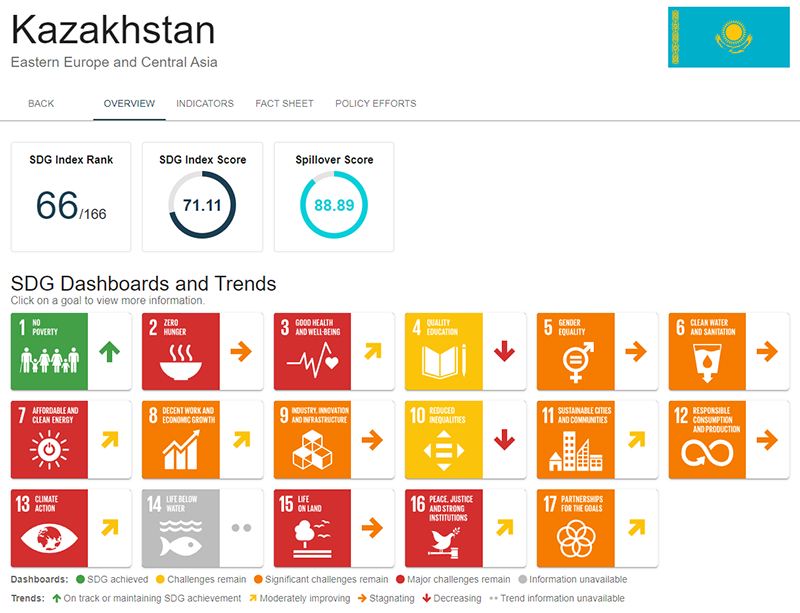
Events. In the course of the year, the following events were held: (1) workshops and meetings to discuss opportunities for achievement of SDGs at the local level (September 13-15, December 4-5); (2) VI Rural Women's Forum "The Role of Rural Women in Shaping Sustainable Development Priorities" (November 17, Astana); (3) workshop "The Role of Public Financing in Achieving SDGs in the Republic of Kazakhstan" (December, Astana).
The delegation of Kazakhstan participated in the: (1) UN Summit on Sustainable Development Goals (New York, USA, September 18,); (2) Global Conference "Public Finance for Inclusive and Sustainable Development: the Role of Strategic Budget Initiatives and Fiscal Policy" (Istanbul, Turkey, November); (3) II Global Forum of Interparliamentary Cooperation on SDGs (Tashkent, Uzbekistan, November 30).
Emergencies and Disasters
In 2023, a total of 12,891 natural and anthropogenic emergencies were recorded in the country, marking a 3.5% decrease compared to the previous year. The economic losses resulting from these disasters amounted to a significant 172,911 million KZT, a substantial increase from the 36,980 million KZT recorded in 2022.
Latest developments in legislation. The Presidential Decree No. 565 of 14.07.2023 was issued to amend and supplement the Government Resolution No. 486 of 16.08.2017. This decree approved action plans to address emergency situations of global and regional scale, including devastating earthquakes, natural fires, floods, highwater, floodwaters, mudflows, and other potential disasters.
New appointments. Syrym Dyusengazievich Sharipkhanov was appointed as the Minister for Emergency Situations (UPRK No.251 of 10.06.2023).
Preventive measures. As part of the Comprehensive Plan for Mudflow, Landslide and Avalanche Safety for 2020-2024, the Ayusai retaining dam was completed in June 2023 to protect the population of Almaty and Almaty Province from potential mudflow disasters. The construction of the Aksai retaining dam and Khorgos dam is ongoing.
To enhance earthquake preparedness, several proactive measures have been implemented: automated earthquake early warning stations installed in Almaty; evacuation routes and assembly points revised and updated; stockpiles of essential medical supplies and equipment established; the public educated on earthquake safety procedures.
Strategies and projects. As part of the Strategy for Development of Cooperation of the Central Asian Countries in Disaster Risk Reduction for 2022-2030 , series of events were organized, including: (1) final meeting of the UNDRR "Strengthening Disaster Resilience and Accelerating Implementation of Sendai Framework for Disaster Risk Reduction in Central Asia" project (February 15); (2) meeting of the Working Group (October 4) of the Regional Forum-Meeting of the Heads of Emergency Authorities of Central Asian countries , where a range of documents was approved and signed (November 10, Almaty).
Under the UNICEF "Capacity Building of the Sectors of Emergency Situations, Health, Education, Social Protection, Internal Affairs on the Core Commitments for Children in Emergencies" project, trainings were held on: (1) instruction of hotline operators in gender-sensitive feedback mechanisms for the population vulnerable to emergencies, including informing the population on resilience to emergencies (May 11-12); (2) preparedness to response to emergency situations taking into account the commitment to children (May 17-18); (3) capacity building of stakeholders on access to water, sanitation and hygiene (WASH) in emergency situations (June 20).
The "Climate Risk Management in Central Asia" project was launched (GIZ) and started with a kick-off meeting of the Steering Committee (June 13-14) and a working visit to Bonn (Germany) to gain insights into German and European approaches, best practices, and technologies related to climate risk management and transboundary early warning systems for hydrometeorological disasters (December 3-8).
Capacity building. Several training programs were conducted during the year: (1) a series of training sessions to enhance skills in utilizing territorial drought response plans (Kokshetau, March 1; Astana, March 14) and developing a comprehensive drought response system based on effective monitoring and forecasting (Astana, March 27); (2) master trainings for canine services personnel from emergency departments across Central Asia (Rock City – Astana, May 15); (3) a training seminar for heads of Crisis Situations Departments and specialists from the Crisis Management Center of the Ministry of Emergency Situations. The focus of this training was on utilizing the web portal "GIS Platform for Emergency Situations" (Turkistan, June 26-28).
Events. The following events were held: (1) regional workshop on lessons learned as part of the USAUD funded implementation program "Strengthening Local and National Capacities for Emergency Preparedness and Response in High Earthquake and Natural hazard prone Countries of Central Asia" (July 19-21); (2) 1st meeting of the Technical Working Group on the creation of the Regional Early Warning and Mutual Information System for disaster threats and occurrence (September 5); (3) International Rescue All-Around Competition "Kazkutkaru-2023" (September 13); (4) seminar on disaster prevention in urban areas (November 2); (6) 14th meeting of the Council of the Center for Emergency Situations and Disaster Risk Reduction (November 9); (7) International Scientific and Practical Conference "Mudflow safety – 50 years of activity of Kazselezaschita: status and prospects" (November 22-24); (8) regional consultation workshop on International Disaster Response Law (December 5).
Regional cooperation. The Kazakh delegation participated in: (1) 35th meeting of the Interstate Council on Natural and Man-Caused Emergency Situations (Yerevan, November 25); (2) extraordinary summit of the OTS Member-States "Emergency Management and Humanitarian Assistance" (Ankara, March 16); (3) regional workshop on strengthening cooperation in disaster management at the national and sub-regional levels (Kuala Lumpur, Malaysia, May 23-25); (4) regional review workshop on loss and damage within the Santiago Network for Asia and the Pacific (Bangkok, Thailand, June 19-21,); (5) ASEAN (Association of Southeast Asian Nations) Interregional Dialogue and Forum on Disaster Resilience (Singapore, June 21-24); (6) 2nd meeting of the Ministers on Disaster and Emergency Management of member and observer states of the OTS (Baku, September 6-8); (7) 2nd high-level dialogue on climate change and resilience in the Central Asian region "Early warning systems for climate change resilience" (Bishkek, September 21-22); (8) Asian Conference on Disaster Reduction (Dushanbe, October 20); (9) 8th meeting of the Regional Expert Group of the Asian and Pacific Centre for the Development of Disaster Information Management (Dushanbe, December 7-8).
Foreign Policy and International Cooperation
Working and official visits. In 2023, the Head of State paid state, official and working visits to the UAE (January, December), Turkey (March, June), PRC (May, October), Russian Federation (May, December), KR (June, October), Kingdom of Saudi Arabia (July), Vietnam (August), Germany (September), USA (September), RT(September), and Belarus (November).
Major Significant Events in the Foreign Policy of the Republic of Kazakhstan in 2023
Kazakhstan's foreign policy is primarily focused on sovereignty and territorial integrity, citizen protection and economic growth.
Several significant events took place: (1) Expert Meeting "Central Asia - 2030: Images of the Future": this meeting focused on strengthening cooperation among Central Asian countries in areas such as trade, economy, transport, energy, human capital development, and cultural exchange (Astana, January 20); (2) Central Asian Interparliamentary Forum: this forum adopted the Turkistan Declaration, which outlined the future trajectory of interparliamentary relations. The declaration emphasized expanding economic cooperation and fostering a shared cultural and historical space for the region (Turkistan, February 10).
Astana hosted: meeting of foreign ministers of Central Asia and the United States in the C5+1 format (February 28); 35th Plenary Session of the Foreign Investors' Council (June 8); Astana International Forum (June 8-9); Kazakhstan-German Business Forum (June 20); International Volunteer Forum (June 21); INNOPROM.QAZAQSTAN International Industrial Trade Fair (September 25-27); Digital Bridge 2023 (October 12-13).
Development of alliances and strategic partnerships. Kazakhstan actively pursues mutually beneficial cooperation with its Central Asian neighbors, as well as with Russia and China.
Within the CIS, Kazakhstan participated in the meetings of: (1) CIS Council of Heads of State (Bishkek, KR, October 13), Council of Heads of Government (Sochi, Russia, June 8; Bishkek, October 26; Moscow, Russia, December 18); (3) , Council of Foreign Ministers (Samarkand, Uzbekistan, April 14; Bishkek, October 12); (4) Economic Council (Moscow, March 17; September 22, online; Moscow, December 8), as well as in the informal Summit of the Heads of CIS Member-States (Saint Petersburg, Russia, December 26).
Within the SCO, Kazakhstan attended the meetings of the SCO Council of Heads of State (July 4, online), SCO Council of Heads of Government (Bishkek, KR, October 26), and SCO Council of Foreign Ministers (Panaji, India, May 4-5).
Within the CSTO, in Minsk Kazakhstan participated in the meeting of the heads of CSTO Member-States (November 23) and in the session of the CSTO Collective Security Council (November 23).
As part of regional cooperation, the Kazakh delegation attended a number of important meetings and fora, including, among many others: (1) 6th Ministerial Meeting in the format "Central Asia-Russia" (Samarkand, Uzbekistan, April 14); (2) 4th Central Asia-China Ministerial Meeting (April 27), Kazakhstan-China investment roundtable (May 18) and 1st China-Central Asia Summit (May 19); (3) II Eurasian Economic Forum (Moscow, Russian Federation, May 24-25,); (4) 2nd meeting of the Heads of Central Asia States and the President of the European Union (Cholpon-Ata, KR, June 2); (5) Meeting of Foreign Ministers of Central Asia (September 13), V Consultative Meeting of the Heads of Central Asia States (September 14), meeting of the Council of Heads of Founder-States of IFAS (September 15) and Dushanbe 2023 International Investment Forum (September 29-30); (6) 6th meeting of the High-Level Working Group on the Caspian Sea (Ashgabat, Turkmenistan, September 11-13).
Chairmanship in international organizations. In 2023, Kazakhstan chaired the (1) OTC and took part in the 2nd Extraordinary Summit "Disaster-Emergency Management and Humanitarian Assistance", which addressed prospects of multilateral cooperation in disaster management and humanitarian assistance, as well as coordination of efforts in preventing and overcoming the consequences of natural disasters (Ankara, Turkey, March 16) and hosted the 10th Summit, which resulted in signature of the Declaration and Protocol on cooperation between relevant institutions of the OTS Member-States in the field of metrology (Astana, November 3); (2) Dialogue of Women of Central Asia.
Promotion of the national interests and reinforcement of the country's image. Kazakhstan actively cooperates with a wide range of international organizations, including the UN, EU, OSCE, OIC, ECO, and others.
UN. On December 18th, 2023, the UN General Assembly adopted a resolution (А/78/127) declaring 2026 as the International Year of Volunteers for Sustainable Development. This significant achievement was initiated by Kazakhstan and supported by like-minded countries from around the world.
Speaking at the 78th UNGA session, the President of Kazakhstan noted that the country plans to launch the Just Energy Transition Partnership and Project Office for Central Asia on Climate Change and Green Energy in Almaty. A significant part of the statement was focused on climate change. It was noted that Kazakhstan, within the framework of its presidency in the IFAS, would continue Kazakhstan will continue to work on preventing further environmental degradation and mitigating the impact of the Aral Sea crisis. The President highlighted the growing environmental challenges facing the Caspian Sea and emphasized the need for international cooperation to protect this vital ecosystem.
The 78th UNGA session also adopted resolutions on: International cooperation and coordination for the human and ecological rehabilitation and economic development of the Semipalatinsk region in Kazakhstan (December 19) and Addressing the legacy of nuclear weapons: providing victim assistance and environmental remediation to Member-States affected by the use or testing of nuclear weapons (New York, USA, December 22).
The Kazakh delegation participated in: (1) virtual summit "Voice of Global South" (January 13, online); (2) summit "Abu Dhabi Sustainability Week – ADSW 2023" (January 16); (3) 1st Gulf Cooperation Council and Central Asia Summit (Jeddah, Kingdom of Saudi Arabia, July 19); (4) Berlin Global Dialogue forum (September 28); (6) meeting of the Heads of Central Asian States with German Chancellor (September 29); (7) III Belt and Road Forum for International Cooperation (Beijing, PRC, October 18); 1st Summit of Heads of State of the UN Special Program for the Economies of Central Asia (SPECA) (Baku, Azerbaijan, November 24). UN Climate Change Conference COP28 (December 1, Dubai, UAE).
Sources:
Official sites of the: President, Ministry of Foreign Affairs, Ministry of Ecology and Natural Resources, Ministry of Water Resources and Irrigation, Ministry of Agriculture, Ministry of Energy, Ministry of Emergency Situations, Legal Information System of the Republic of Kazakhstan, Institute of Economic Research
Information agencies: inbusiness.kz, ainews.kz, kazenergy.com, forbes.kz, kursiv.kz, informburo.kz, liter.kz, kazaral.org, kazakh-zerno.net, inform.kz, kaztag.kz, centrasia.org
